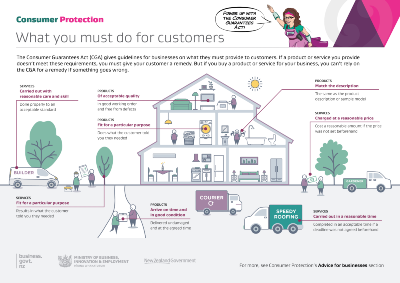When you must provide a remedy to a customer’s problem — and times when it’s fair to turn down a complaint.
The Consumer Guarantees Act (CGA) says customers can get a replacement, repair, or refund for:
- faulty products
- substandard services
- late deliveries
- being overcharged if the price wasn’t set beforehand.
But you do not have to give a refund, repair, or replacement if the customer:
- changes their mind
- caused the problem either on accident or on purpose
- doesn’t follow your advice about a product’s use or care, for example, washing instructions
- goes to someone else for repairs before coming to you.
You also do not have to give a remedy if the problem was caused by something beyond your control, for example, an earthquake.
Obligations under the Consumer Guarantees Act
Act fast
The steps you must take depend on what’s gone wrong and how serious it is. But in all cases, you must act promptly. Lack of action will annoy your customer. It will also count against you if a complaint goes to the Disputes Tribunal or District Court.
This doesn’t mean immediately giving a refund, repair, or replacement. It means taking the customer seriously and looking into their complaint.
It’s your right to investigate before deciding what to do. Find out as much as you can before you decide what — if any — remedy to offer. If a customer makes a complaint that seems unreasonable — or they don’t give you enough information up front — be polite but assertive.
It’s a good idea to print out our visual guide to what you must do for customers under the Consumer Guarantees Act (CGA). Pin it up where you and any staff can easily check it, for example, the break room or back of the staff toilet door.
What you must do for customers
Find out more about what you must do for customers under the CGA.

Download guide: What you must do for customers under the CGA [PDF, 538 KB]
Once you know it's a valid complaint
If it’s a minor problem, for example a poorly made coffee or pen that doesn’t work, you must put it right as soon as possible. This means offering a remedy, which is either a:
- replacement
- repair
- refund.
It’s up to you which to offer.
When something is seriously wrong with a product or service, you must put it right in the way the customer chooses — after fully investigating, of course. Typically, this means a replacement or full refund. You must also cover any extra costs caused by the problem.
Fair returns policies
The best way to resolve problems quickly and fairly is to give customers clear information about your returns policy and have an effective complaints process.
Use these templates so you, your staff and customers know how complaints will be handled:
Refund policy sign [PDF, 795 KB]
Complaint record form [PDF, 810 KB]
Complaints process checklist [PDF, 3.2 MB]
It’s up to you whether you offer the legal minimum, or more than the legal minimum. It can help foster goodwill if you are prepared to be a little more generous.
Fair returns and complaints policies(external link) — business.govt.nz

